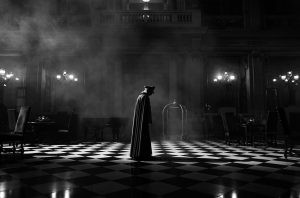The first screening of a film festival always generates immense buzz. Especially at the biggest festival in the world, where some of the year’s most anticipated movies are available for a couple of days. Everyone wants to start their coverage with a phenomenal film in order to establish a “favorite to beat”, so it’s common that opening flicks suffer from unrealistically high expectations. The fact that El Conde belongs to a streaming studio also doesn’t sit well with Venice’s audience, but the truth is that it left me quite satisfied.
I’m not, by any means, the greatest connoisseur of Pablo Larraín’s (Spencer) career, nor of Chilean history and its dictator Augusto Pinochet, on whom El Conde bases its story to carry out an efficient sociopolitical satire, albeit somewhat repetitive. Guillermo Calderón and Larraín’s screenplay focuses on the Pinochet family’s obsession with money and power through a fantastical black comedy, transforming the protagonist into a vampire, and using the characteristics usually associated with these dark beings as objects of comparison with behaviors from humans driven by futile riches.
El Conde Critique

Also Read: Ferrari Venice Film Festival Review
The satire reaches its height when it employs irony and sarcasm to basically turn the concepts of “good” and “evil” upside down, portraying Pinochet as a victim misunderstood by the world. Poor man who killed thousands of Chileans to sustain his eternal life or the countless tax frauds to be able to enjoy a life of luxury. Even the very question of him being the only vampire in the family and not wanting to leave this “inheritance” to anyone is observed from a point of view in which the dictator is practically a martyr. A sequence of interviews with his sons and daughters beautifully exemplifies this narrative component.
El Conde is quite clear with his allegorical message that, just as vampires live forever on the blood of others and never disappear, a politician’s crimes, lies, and thefts also go unpunished. The lack of historical knowledge about the country or international politics is a factor that inevitably weighs on the enjoyment of the movie, something I admit I felt during a section of the third act. However, Larraín makes up for any comprehension issues with moments of exquisite humor and brutally bloody violence.
Edward Lachman’s (Dark Waters) cinematography is absolutely gorgeous. As an avid fan of black-and-white films, these colors are crystal clear on the big screen, creating a truly immersive atmosphere. The wide shots that accompany the vampire’s flights are nothing short of stunning, being elevated by the equally cinematic sound production. El Conde isn’t shy when it comes to its levels of gore on display, showing completely unrestrained decapitations, including those of animals, so here’s my warning for more sensitive viewers.
Technically superb and narratively effective, but leaves something to be desired when it comes to its satirical layer, as well as character development. El Conde gets lost in his redundant insistence on getting the message across that Pinochet was a greedy, insatiable, corrupt, self-centered man, just like his millionaire family who, even so, wishes for more and more wealth. Most of the characters end the movie the same way they started it, being mere pawns in a story totally guided by its sociopolitical commentary.

In addition to this, the role of a nun in the main plot leaves questions to be clarified, while the storyline featuring the children’s obsession with owning their father’s riches never manages to gain real attention, apart from the sequence of interviews mentioned above, which stands out more for its editing (Sofía Subercaseaux) and quick, thought-provoking dialogue than for any tangible interest in the characters. That said, the third act carries a more active entertainment value, full of humor and violence that will wake up the more “sleepy” viewers. It also serves the purpose of making me want to research Chilean history and Pinochet.
In Conclusion
El Conde delivers an effective, brutally gory sociopolitical satire packed with sarcastic commentary, offering an amusing narrative that compares the eternity of vampires with the impunity of the Chilean dictator’s crimes. Technically wonderful, employing a stunning black-and-white canvas that will leave any cinephile delighted, as well as excellent contributions from cinematography, score, and editing for a captivating immersive experience. Underdeveloped characters and repetitive messages remove some of the biggest impact the film could have had.
7/10
Follow us for more entertainment coverage on Facebook, Twitter, Instagram, and YouTube.


